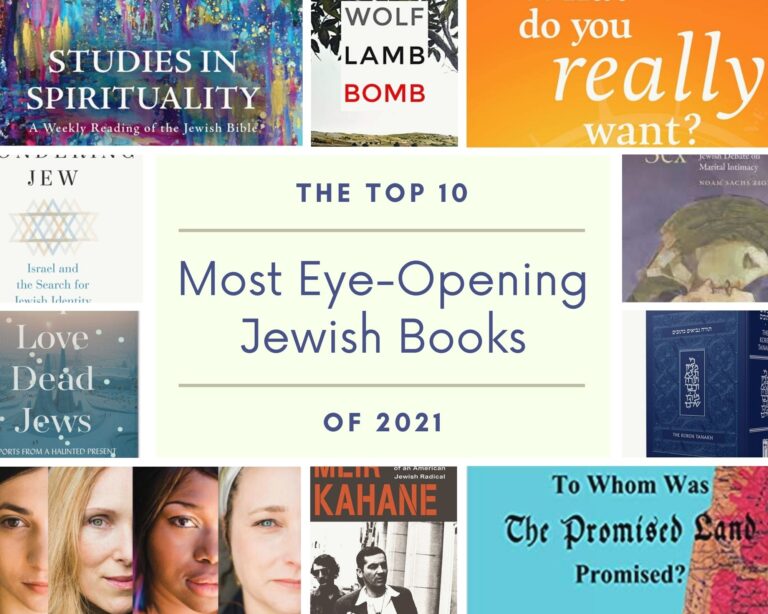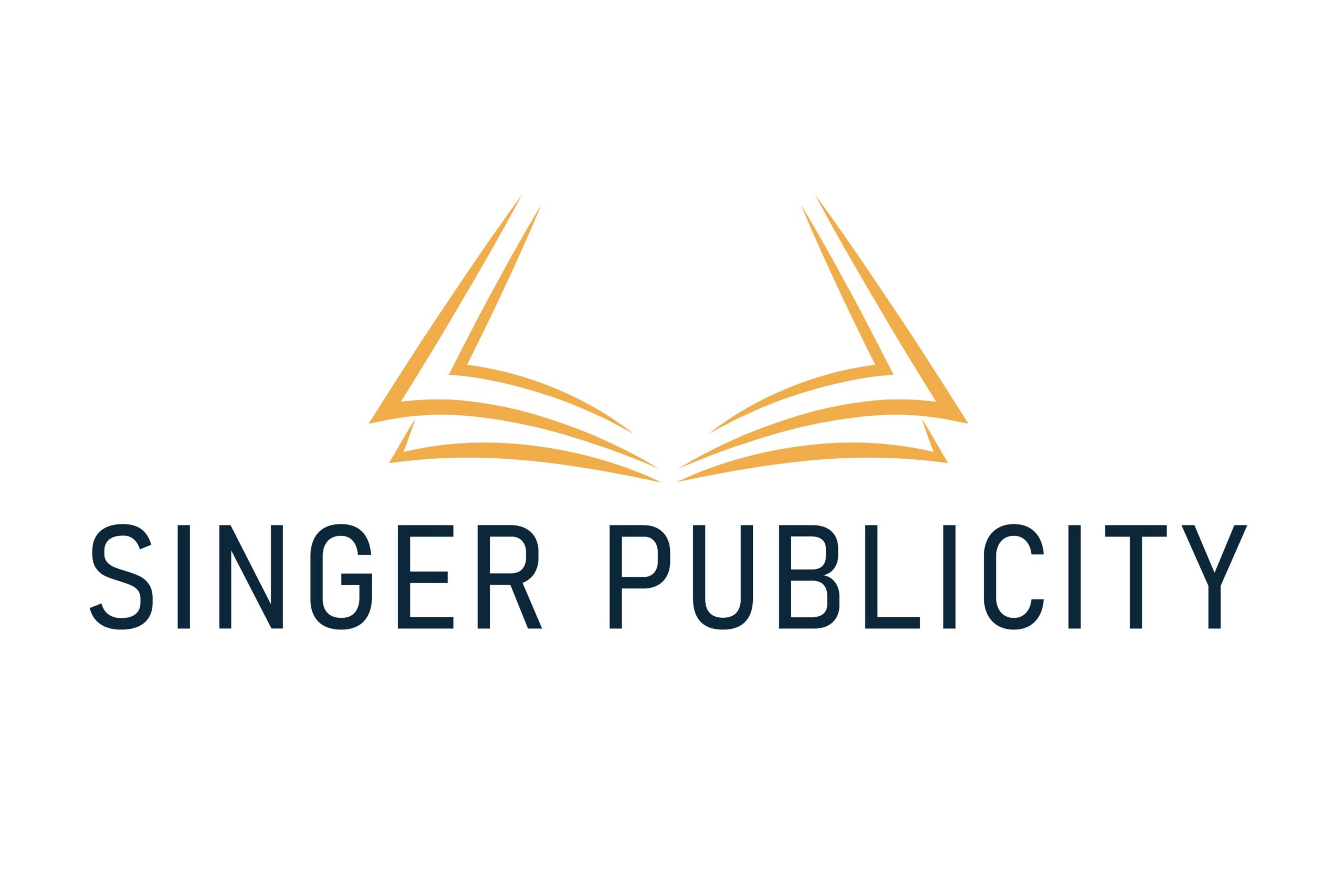The Top 10 Most Eye-Opening Jewish Books of 2021
As this year comes to an end, we reflect on our achievements and areas of defeat. We take stock of ourselves, and take steps to succeed in the coming year. There’s no doubt that this year, like last, has been one of instability. We have all been hoping the global pandemic would be behind us, but alas, here we are dealing with the new Omicron variant of Covid, travel restrictions, and fear once again.
For a strong dose of inspiration, we are presenting a list of some of the most eye-opening and impactful Jewish books of 2021.
The selections we’ve made are an eclectic mixture – all of them highly relevant for Jewish living today, wherever you are spiritually, religiously or culturally. What they have in common, to varying degrees, is that they put forth new ways of thinking, fresh ways of engaging with the texts, with tradition, and with ourselves.
In short, these books will make an IMPACT on you. They’ll raise important conversations that we should all be having to make Jewish living meaningful today.
It was very difficult to choose from all the submissions we received, so this list is not meant to rank these titles in any preferential order.
If you didn’t get to read these titles this year, now’s the time to start your 2022 wish list now.

1.
What Do You Really Want? Trust and Fear in Decision Making at Life’s Crossroads and in Everyday Living by Shayna Goldberg
Shayna Goldberg’s book is a breath of fresh air, especially because it guides us on how to deal with confusing situations in life – many of them baring religious, spiritual, social and financial implications. The book doesn’t tell you what to do or how to do it. The author’s goal is to give readers tools unravel the complexity of a confusing life decision and, as the title states, identify what YOU really want (after reading this book, the emphasis does point to “YOU”). With the approach she offers, Goldberg, an educator and yoetzet halacha, helps readers tap into their inner selves, not necessarily what ‘everyone else’ expects them to want. What she does emphasize is the importance of thinking about the long-term implications of one’s decisions.
Since she has mentored so many people in real life situations, she addresses situations that are rife with deliberation and frequently come with reams of social pressures: choosing a seminary/yeshiva, choosing a college, dating, divorce, financial decisions.
This book is helpful for teens, young adults, camp directors, youth group counselors, young professionals AND their parents and mentors.
2.
Studies in Spirituality by Rabbi Lord Jonathan Sacks
This is the first of Rabbi Sacks’ parasha series to be published since his passing and it’s a beautiful tribute. Here, the Rabbi reminds us that while there is an authoritative code of Jewish law, when it comes to the spiritual dimension, we each have our own path to God.
As we read the essays for each parasha, we see that Rabbi Sacks is teaching us to take responsibility; not only for the world around us, but for ourselves and our own intimate relationship with God,
In his introduction he writes, “Spirituality is not the same as ‘religion’, though the two are related. In essence, spirituality is what happens when we open ourselves to something greater than ourselves… I decided to write about spirituality because so many people I meet are searching for it, and because they say they do not always find it in Judaism today. Those who are engaged in a spiritual search are not always religious in the conventional sense. Some describe themselves as secular, cultural or ethnic Jews. I find this very beautiful… Sometimes ordinary people who don’t see themselves as religious can have more faith than religious leaders. Not everyone is a master of Jewish law, but spirituality is engraved in all our souls.”
Includes a beautiful foreword and tribute by Sivan Rahav Meir.
This book will uplift anyone’s understanding and appreciation for the Torah portion, across denominations and affiliations.
3.
Layers: Personal Narratives of Struggle, Growth and Resilience from Jewish Women by Shira Lankin Sheps
The look of this book is striking. Vibrant, royal, elegant. The fact that there are religious women on the cover hints to the bold courage of the content inside.
Layers is an outgrowth of the prudent work seen on Layers Project online magazine, founded and written by the author. Shortly upon making Aliyah, she traveled Israel interviewing women about extremely personal issues they had experienced, healed from, and were courageous enough to tell their stories.
These 34 profiles are at once inspiring, courageous, admirable, honest, sad, and heart-stirring. They show how dedicated these women have been to their families, their parents, their children, their spouses, and most importantly, to themselves.
The book – gorgeous in design and layout with full color photos taken by the author herself – sets out to challenge stigmas about physical and mental health issues. It explicitly addresses issues that are common, but not usually discussed openly – grief, loss, fertility challenges, mental health, racism, challenges in conversion, dealing with one’s own or her spouse’s health challenges, eating disorders, divorce, healing, compassion – and offers questions for reflection.
We see this work as really a public service; it should be read in every book club, synagogue, and organization.
4.
People Love Dead Jews: Reports from a Haunted Present by Dara Horn
Well, the title certainly shocking and the widespread press coverage this new book is getting makes it clear: Dara Horn’s newest masterpiece is raising an uncomfortable truth that is becoming more and more palpable.
“A startling exploration of how Jewish history is exploited to flatter the living…Horn draws upon her travels, her research, and also her own family life… to assert the vitality, complexity, and depth of Jewish life against an antisemitism that, far from being disarmed by the mantra of “Never forget,” is on the rise.”
5.
To Whom Was the Promised Land Promised? By Abraham Sion
Legal scholar and former Deputy State Attorney Abraham Sion sets out to prove who actually owns the legal title to the land previously known as “Mandate Palestine” (i.e. Israel today) through the eyes of international law. After years of meticulous research, his conclusions will surprise readers, especially those whose opinions are based on the media.
As he examines the founding documents, treaties and resolutions that make up the Middle East, he traces the development of phrases like “West Bank”, “Occupied Palestinian Territories”, “Settlements” and wishes to set the score right: according to international law, are the Israeli settlements illegal?
This is an excellent resource guide for Israel activists, policy makers, journalists, scholars, and anyone seriously curious about the sources of the conflict in the Middle East.
6.
The Magerman Edition New Koren Tanakh
Many readers, especially you Bible aficianados, are probably thinking: Mah nishtana halayla hazeh?” Why is this Tanakh different from all other Sifrei Tanakh (editions of Hebrew Bible)? To begin with, this Tanakh looks modern and elegant.
Once you begin reading whether in Hebrew or the English translation, you quickly become transfixed. The verses flow, poetically, yet at the same time they retain a certain feel that makes the narrative compelling, meaningful, intriguing.
Rabbi Jonathan Sacks and Rabbi Dr. Tzvi Hersh Weinreb are the most well-known names associated with the project, but there were actually close to a dozen translators who worked on this project for close to a decade. The result is superb and their intentionality can be felt in every line.
There are timelines before each book, color maps and charts, which are valuable and give wider context to the biblical narratives. Together, the edition is usable to readers of all backgrounds.
For an in-depth analysis of the translation, read Rav Johnny Solomon’s article here.
7.
The Wondering Jew: Israel and the Search for Jewish Identity by Micah Goodman*
“Israel has become a place of fragmentation, between those who sanctify religious tradition and those who wish to escape its grasp. Now a new middle ground is emerging between religious and secular Jews who want to engage with their heritage—without being restricted by it or losing it completely…
In this incisive book, acclaimed author Micah Goodman explores Israeli Judaism and the conflict between religion and secularism, one of the major causes of political polarization throughout the world. Revisiting traditional religious sources and seminal works of secularism, he reveals that each contains an openness to learn from the other’s messages. Goodman challenges both orthodoxies, proposing a new approach to bridge the divide between religion and secularism and pave a path toward healing a society torn asunder by extremism.”
8.
Sanctified Sex: The Two-Thousand-Year Jewish Debate on Marital Intimacy * by Noam Sachs Zion
From the publisher: “Sanctified Sex draws on two thousand years of rabbinic thought and law to address contesting aspirations for loving intimacy and sanctity in marriage. Zion … presents a full spectrum of Jewish life through its texts, from biblical texts and their Talmudic interpretations, through Medieval commentators (including Maimonides, prescribing his homemade Viagra) to ultra-Orthodox rabbis who clash over radically divergent ideals. Finally, Zion shows how rabbis of the Modern Orthodox, Conservative, Reform, Reconstructionist, Havurah, and Jewish Renewal movements are wrestling with modern transformations in sexual lifestyles and values.”
Given that this is a hefty 500 page volume, it seems that Jewish tradition, indeed, as a lot to say about this topic. It is truly a remarkable feat to span such diverse voices with different philosophical perspectives on Judaism. We are sure this volume will spur much needed conversation about a topic that is usually quite hush-hush.
9.
by Aviyah Kushner
“Aviya Kushner’s debut poetry collection, Wolf Lamb Bomb, revives and reimagines the Book of Isaiah in an intimate conversation between woman and prophet. In the aftermath of September 11th, ongoing violence in the Middle East, and resurgent antisemitism, Kushner reflects on a Biblical understanding of humanity and justice. Wolf Lamb Bomb wonders equally about our relationship with an inherited past and our desire to understand the precarious present. These poems place the prophet Isaiah in the position of poet, crooner, and rival as they search for a guide in poetry and in life.”
10.
Meir Kahane: The Public Life and Political Thought of an American Jewish Radical* by Shaul Magid
There is no shortage of controversial figures in 20th century America-Israel relations, but there are a couple in particular whose legacies elicit ambivalent feelings. Meir Kahane is certainly one of them. There are those who revile the man’s ideology (the organization he founded *was* named a terrorist….), yet there are many who still admire him and his tactics. We were surprised to see this book come out at all, let alone from an academic and progressive thinker such as Shaul Magid.
Shaul Magid, an academic, and writer must have been just as confounded as we are about Kahane. Here, he researches this man to untangle the influence that this personality had and continues to have. He researches his life, philosophy and puts him into historical context. Moreover, he analyzes the ‘deep ambivalence’ that many contemporary Jews feel towards Kahane’s legacy. The respected Dartmouth scholar Susannah Heschel writes, ““Magid’s analysis is deeply disturbing and extremely important.”
We hope that you’ll make time to read through some of these worthwhile masterpieces this coming year.
HAPPY 2022 & READING, EVERYONE!
(*Currently on our wish list.)
